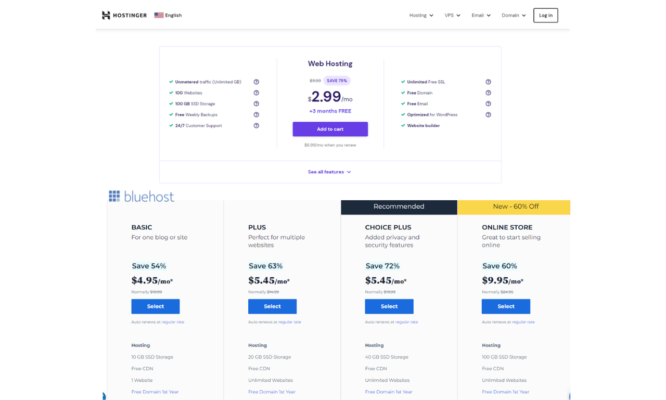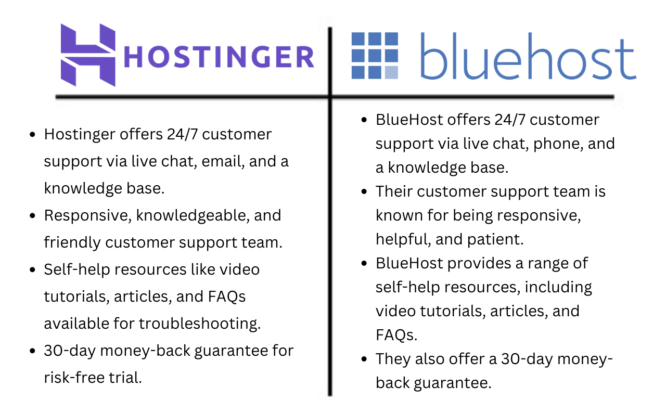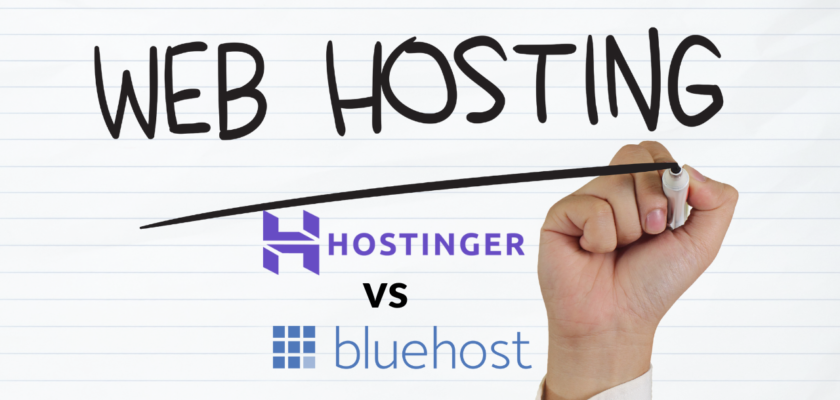Introduction
When it comes to building a website, choosing the right web hosting provider is an essential step in ensuring your website's success.
A good web hosting provider not only guarantees the stability and security of your website but also plays a crucial role in website performance and user experience.
Among the many hosting providers available, Hostinger and Bluehost are two of the most popular options, with millions of websites hosted on each.
What is Hostinger?
Hostinger, founded in 2004, has grown rapidly to become one of the largest web hosting providers in the world, offering affordable hosting plans with an emphasis on speed, security, and customer support.
What is Bluehost?
Bluehost, founded in 2003, is also a well-known web hosting provider, and is particularly popular for its WordPress hosting plans, offering a range of features and tools specifically designed for the WordPress platform.
Comparison Hostinger vs Bluehost; Web Hosting providers
In this article, we will provide a comprehensive comparison of Hostinger and BlueHost, focusing on the key factors that are important to website owners, including performance, features, pricing, and customer support.
Price and Value

When it comes to web hosting, pricing is an important factor to consider, as it can impact both your budget and the overall value of your investment. Hostinger and BlueHost offer a range of hosting plans at different price points, with varying features and benefits.
| Hostinger | Bluehost |
|
|
|
|
|
|
|
|
|
|
|
|
In terms of pricing and value, both Hostinger and BlueHost offer good options for different types of website owners, with competitive pricing plans and a good set of features. It's important to evaluate your own website needs and budget when choosing a provider and to take advantage of any promotions or discounts available to get the most value for your investment.
Performance and Uptime
When it comes to website hosting, performance, and uptime are crucial factors that can have a significant impact on your website's success. Performance refers to how quickly your website loads and responds to user actions, while uptime refers to the percentage of time that your website is available and accessible to visitors.
To measure performance and uptime, hosting providers typically use a range of tools and metrics, including server response time, page load speed, and uptime percentages.
| Hostinger | Bluehost |
|
|
|
|
|
|
|
|
Overall, when it comes to performance and uptime, both Hostinger and Bluehost offer good options, with strong server technology and uptime guarantees. While Hostinger boasts faster server response times, BlueHost's custom caching system may offer better performance for WordPress websites. It's important to evaluate your own website needs and goals when choosing a provider and to prioritize reliable performance and uptime to ensure the best possible user experience and search engine rankings.
Features and Ease of Use
When it comes to choosing a web hosting provider, features and ease of use are important factors to consider. Both Hostinger and BlueHost offer a range of features that can make managing your website easier, including website builders, email hosting, and one-click installs of popular content management systems like WordPress.
| Hostinger | Bluehost | |
| Features |
|
|
|
|
|
|
|
|
|
|
|
| Ease of Use |
|
|
|
|
|
|
|
Overall, when it comes to features and ease of use, both Hostinger and Bluehost offer good options. Hostinger's custom control panel and easy-to-use website builder may be particularly appealing to beginners, while BlueHost's use of cPanel may be more familiar to those with previous web hosting experience. It's important to evaluate your own website needs and goals when choosing a provider and to consider which set of features and control panels will work best for you.
Customer Support
Good customer support is crucial for web hosting providers, as website owners need access to knowledgeable and helpful support when issues arise.

Overall, when it comes to customer support, both Hostinger and Bluehost offer strong options, with 24/7 support and comprehensive knowledge bases available. It's important to evaluate your own support needs and preferences when choosing a provider and to prioritize a provider that offers responsive and knowledgeable support.
Security and Backups
Website security and backups are essential considerations for website owners, as they can help to protect your website and data in the event of an attack or data loss. Hostinger and Bluehost both offer a range of security and backup features to help keep your website safe and secure.
| Hostinger | Bluehost |
|
|
|
|
|
|
|
|
Overall, both Hostinger and BlueHost offer strong security and backup options, with a range of features and tools to help keep your website secure and backed up. Hostinger's custom control panel includes a range of advanced security features, while BlueHost's use of cPanel may be more familiar to those with previous web hosting experience. It's important to evaluate your own website security and backup needs when choosing a provider and to prioritize a provider that offers robust security and backup solutions.
Conclusion
In conclusion, the choice between Hostinger and Bluehost will depend on your own website needs and preferences. If you are looking for a user-friendly control panel with a range of advanced security features, Hostinger may be the better choice for you. On the other hand, if you are looking for a more familiar control panel with a range of features and backup options, Bluehost may be the better choice.
It's important to carefully evaluate your own web hosting needs and preferences and to prioritize factors like performance, uptime, security, backups, and customer support when choosing a provider. Choosing the right web hosting provider can have a significant impact on your website's success, so it's important to take the time to make an informed decision.




